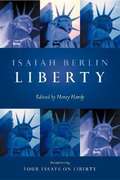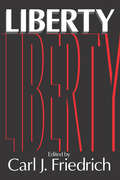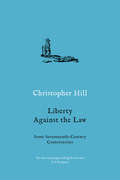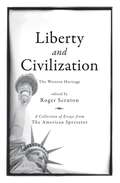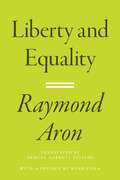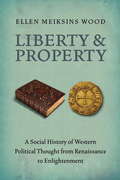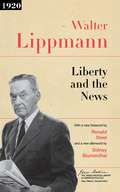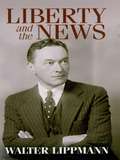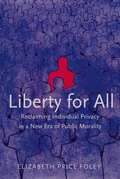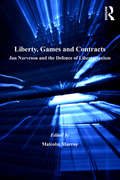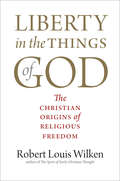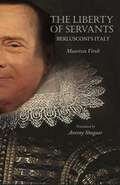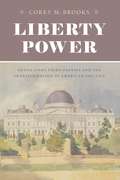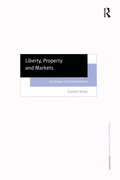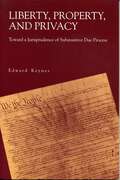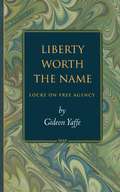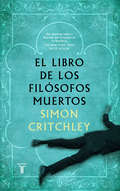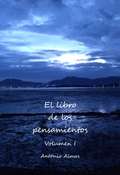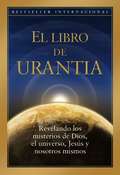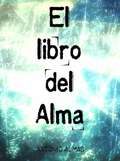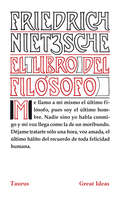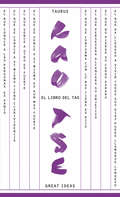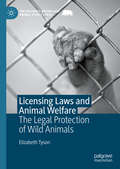- Table View
- List View
Liberty: Incorporating Four Essays on Liberty
by Isaiah BerlinLiberty is a revised and expanded edition of the book that Isaiah Berlin regarded as his most important-Four Essays on Liberty. Edited by Henry Hardy
Liberty (Nomos Ser. #No. 4)
by Carl J. FriedrichRecent writing on the nature of freedom has served to underline a crucial gap in the academic experience. First--and most obviously--the concept of freedom has been modernized by its application to contemporary institutions. Second, a new approach to the concept of liberty has been pioneered in the construction of new typologies of freedom. Finally, awareness of variety in concepts of freedom has been paralleled in variations in the practice of freedom. The tumultuous history of Western man may be conceptualized as the story of how freedom has become embodied. What is missing from the story is the relationship of concepts to actions.This relationship has been established for some specific notions of freedom. Many of the philosophical analyses--especially recent ones like pragmatism and existentialism--have been predicated on actual human behavior. On the other hand, many classic histories of freedom--those of Georg Wilhelm Friedrich Hegel, John Bagnell Bury, Guido de Ruggiero, and Harold Laski--have traced the actual development of a definite kind of freedom.This volume contains essays prepared to celebrate the anniversary of the publication of John Stuart Mill's On Liberty, revised in the light of discussions by Henry D. Aiken, William Ebenstein, Mark DeWolfe Howe, and David Spitz, as well as other articles, many of them growing out of the discussion either in the form of commentary or independent contributions. There are also two papers written independently (Andrew Hacker and Leonard Krieger).
Liberty Abroad
by Georgios VarouxakisJohn Stuart Mill (1806-1873) is widely regarded as the pre-eminent thinker of the liberal tradition; and yet because his views on international relations cannot be traced in any particular book or essay, his political thought remains largely misunderstood. Liberty Abroad is the first comprehensive, critical study which brings together all of John Stuart Mill's extensive contributions with particular attention to the historical contexts in which they were produced, as well as the political and philosophical preoccupations that prompted them, and how they were received among his contemporaries. As a leading Mill scholar, Georgios Varouxakis combines meticulous mastery not only of Mill's own varied and extensive writings, but across a diverse range of Victorian controversies to give a full and subtle evaluation of a major aspect of Mill's thinking in this definitive study which offers a valuable contribution to an area of increasing scholarly interest: the history of international political thought.
Liberty Against the Law: Some Seventeenth-Century Controversies
by Christopher HillA classic study of popular resistance to the momentous changes of 17th century EnglandIn 17th Century England, the law was not an instrument of justice - it was an instrument of oppression. The enclosures of common land, loss of many traditional rights and draconian punishments for minor transgressions changed the lives of the peasantry and created a landless class of wage labourers. In this, the last book published during his lifetime, renowned historian of the English Revolution Christopher Hill explores the immense social changes that occurred and the expressions of liberty against the law through the literary culture of the times and the hero-worship of the outlaw. As well as chapters on gypsies and vagabonds, Hill analyses class, religion and the shift away from the importance of the church after the Reformation. Liberty Against the Law is a late classic of Hill's work, and essential reading for anyone interested in the history and politics of the 17th Century.
Liberty and Civilization
by Roger ScrutonAn essential volume of essays commissioned by the American Spectator and edited by the philosopher Roger Scruton, Liberty and Civilization examines the intellectual and spiritual traditions of our belief in individual liberty, from its Judeo Christian origins on through Enlightenment philosophy. As we are confronted by belligerent atheism at home and jihadist Islam abroad, Liberty and Civilization is an invaluable tool for understanding why it is critical that we defend the cultural, religious, and intellectual institutions that have made our civilization great.As one would expect from the American Spectator, the responses are both fiery and edifying, representing a broad swath of American conservative thought. The essayists include Paul Johnson, Anne Applebaum, Robert Bork, Robert P. George, Christina Hoff Sommers, and Roger Scruton.
Liberty and Equality
by Raymond AronAn invaluable reflection on the essence of liberal democracy—and an ideal introduction to the work of political philosopher Raymond AronLiberty and Equality is the first English translation of the last lecture delivered at the Collège de France by Raymond Aron, one of the most influential political and social thinkers of the twentieth century. In this important work, the most prominent French liberal intellectual of the Cold War era presents his views on the core values of liberal democracy: liberty and equality. At the same time, he provides an ideal introduction to key aspects of his thought.Ranging from Soviet ideology to Watergate, Aron reflects on root concepts of democracy and representative government, articulates a notion of liberty or freedom as equal right as distinct from equal outcome, and discusses different kinds of liberties: personal, political, religious, and social. In search of a common truth or at least a common good, and analyzing what he perceives as the crisis of liberal democracies, Aron opens a space for reexamining the relation between liberty and equality.
Liberty and Property
by Ellen Meiksins WoodThe formation of the modern state, the rise of capitalism, the Renaissance and Reformation, the scientific revolution and the Age of Enlightenment have all been attributed to the "early modern" period. Nearly everything about its history remains controversial, but one thing is certain: it left a rich and provocative legacy of political ideas unmatched in Western history. The concepts of liberty, equality, property, human rights and revolution born in those turbulent centuries continue to shape, and to limit, political discourse today. Assessing the work and background of figures such as Machiavelli, Luther, Calvin, Spinoza, the Levellers, Hobbes, Locke and Rousseau, Ellen Wood vividly explores the ideas of the canonical thinkers, not as philosophical abstractions but as passionately engaged responses to the social conflicts of their day.
Liberty and the News (The James Madison Library in American Politics)
by Walter LippmannLiberty and the News is Walter Lippman's classic account of how the press threatens democracy whenever it has an agenda other than the free flow of ideas. Arguing that there is a necessary connection between liberty and truth, Lippman excoriates the press, claiming that it exists primarily for its own purposes and agendas and only incidentally to promote the honest interplay of facts and ideas. In response, Lippman sought to imagine a better way of cultivating the news. A brilliant essay on a persistent problem of American democracy, Liberty and the News is still powerfully relevant despite the development of countless news sources unimagined when Lippman first published it in 1920. The problems he identifies--the self-importance of the press, the corrosion of rumors and innuendo, and the spinning of the news by political powers--are still with us, and they still threaten liberty. By focusing on the direct and necessary connection between liberty and truth, Lippmann's work helps to clarify one of the most pressing predicaments of American democracy today.
Liberty and the News
by Walter Lippmann Robert McchesneyWritten in the aftermath of World War I, this polemic by the Pulitzer Prize-winning journalist exposes the threat to democracy posed by media bias. Walter Lippmann denounces the wartime misinformation and propaganda fed to the public by the press, calling for an honest, "spin-free" interpretation of facts and ideas. Written in an accessible rather than a scholarly style, this treatise consists of three essays that examine the tenuous relationship between facts and news and the consequences of media distortion. Its conclusions helped establish the standards of objective reporting that were subsequently embraced by reputable news-gathering agencies. Walter Lippmann was the United States's most respected political journalist for nearly fifty years. Although this volume was first published nearly a century ago, it remains relevant to those seeking sound information as the basis for informed judgments. This edition includes "A Test of the News" by Walter Lippmann and Charles Merz, and a Preface by Robert McChesney is included as well.
Liberty for All: Reclaiming Individual Privacy in a New Era of Public Morality
by Elizabeth Price FoleyIn the opening chapter of this book, Elizabeth Price Foley writes, "The slow, steady, and silent subversion of the Constitution has been a revolution that Americans appear to have slept through, unaware that the blessings of liberty bestowed upon them by the founding generation were being eroded." She proceeds to explain how, by abandoning the founding principles of limited government and individual liberty, we have become entangled in a labyrinth of laws that regulate virtually every aspect of behavior and limit what we can say, read, see, consume, and do. Foley contends that the United States has become a nation of too many laws where citizens retain precious few pockets of individual liberty. With a close analysis of urgent constitutional questions--abortion, physician-assisted suicide, medical marijuana, gay marriage, cloning, and U. S. drug policy--Foley shows how current constitutional interpretation has gone astray. Without the bias of any particular political agenda, she argues convincingly that we need to return to original conceptions of the Constitution and restore personal freedoms that have gradually diminished over time.
Liberty, Games and Contracts: Jan Narveson and the Defence of Libertarianism
by Malcolm MurrayJan Narveson is one of the most significant contemporary defenders of the libertarian political position. Unlike other libertarians who typically defend their view with reference to natural rights or an appeal to utilitarianism, Narveson's main contribution has been to offer a philosophical defence of libertarianism based on a Hobbesian individualist contractarian ethic. Critiques of Narveson's contractarian libertarianism fall into three categories, those that reject contractarian moral theory, those that reject any link between contractarianism and libertarianism and those that accuse libertarians of conflating liberty with property. In this book Malcolm Murray brings together the most significant of Narveson's critics and presents their work alongside replies by Jan Narveson.
Liberty in the Things of God: The Christian Origins of Religious Freedom
by Robert Louis WilkenFrom one of the leading historians of Christianity comes this sweeping reassessment of religious freedom, from the church fathers to John Locke In the ancient world Christian apologists wrote in defense of their right to practice their faith in the cities of the Roman Empire. They argued that religious faith is an inward disposition of the mind and heart and cannot be coerced by external force, laying a foundation on which later generations would build. Chronicling the history of the struggle for religious freedom from the early Christian movement through the seventeenth century, Robert Louis Wilken shows that the origins of religious freedom and liberty of conscience are religious, not political, in origin. They took form before the Enlightenment through the labors of men and women of faith who believed there could be no justice in society without liberty in the things of God. This provocative book, drawing on writings from the early Church as well as the sixteenth and seventeenth centuries, reminds us of how “the meditations of the past were fitted to affairs of a later day.”
The Liberty of Servants: Berlusconi's Italy
by Maurizio ViroliA compelling look at how a people can be unfree even though they are not oppressedItaly is a country of free political institutions, yet it has become a nation of servile courtesans, with Silvio Berlusconi as their prince. This is the controversial argument that Italian political philosopher and noted Machiavelli biographer Maurizio Viroli puts forward in The Liberty of Servants. Drawing upon the classical republican conception of liberty, Viroli shows that a people can be unfree even though they are not oppressed. This condition of unfreedom arises as a consequence of being subject to the arbitrary or enormous power of men like Berlusconi, who presides over Italy with his control of government and the media, immense wealth, and infamous lack of self-restraint.Challenging our most cherished notions about liberty, Viroli argues that even if a power like Berlusconi's has been established in the most legitimate manner and people are not denied their basic rights, the mere existence of such power makes those subject to it unfree. Most Italians, following the lead of their elites, lack the minimal moral qualities of free people, such as respect for the Constitution, the willingness to obey laws, and the readiness to discharge civic duties. As Viroli demonstrates, they exhibit instead the characteristics of servility, including flattery, blind devotion to powerful men, an inclination to lie, obsession with appearances, imitation, buffoonery, acquiescence, and docility. Accompanying these traits is a marked arrogance that is apparent among not only politicians but also ordinary citizens.
Liberty Power
by Corey M. BrooksAbraham Lincoln's Republican Party was the first party built on opposition to slavery to win on the national stage--but its victory was rooted in the earlier efforts of under-appreciated antislavery third parties. Liberty Power tells the story of how abolitionist activists built the most transformative third-party movement in American history and effectively reshaped political structures in the decades leading up to the Civil War. As Corey M. Brooks explains, abolitionist trailblazers who organized first the Liberty Party and later the more moderate Free Soil Party confronted formidable opposition from a two-party system expressly constructed to suppress disputes over slavery. Identifying the Whigs and Democrats as the mainstays of the southern Slave Power's national supremacy, savvy abolitionists insisted that only a party independent of slaveholder influence could wrest the federal government from its grip. A series of shrewd electoral, lobbying, and legislative tactics enabled these antislavery third parties to wield influence far beyond their numbers. In the process, these parties transformed the national political debate and laid the groundwork for the success of the Republican Party and the end of American slavery.
Liberty, Property and Markets: A Critique of Libertarianism (Ashgate New Critical Thinking in Philosophy)
by Daniel AttasLibertarianism attempts to establish a set of property rights as a complete political morality, its argument proceeding from liberty tout court, as the unique foundational aspect of well being that grounds rights. In this book, Attas presents a sympathetic reconstruction of the libertarian argument and then brings to bear a critical evaluation leading to an ultimate rejection of libertarianism. Exposing the limitations of libertarianism and disclosing its errors, Attas argues that the rights which libertarians adopt with respect to persons (self-ownership), natural resources (original acquisition) and products are indefensible given what liberty must be.
Liberty, Property, and Privacy: Toward a Jurisprudence of Substantive Due Process (G - Reference, Information and Interdisciplinary Subjects)
by Edward KeynesIn this book, Edward Keynes examines the fundamental-rights philosophy and jurisprudence that affords constitutional protection to unenumerated liberty, property, and privacy rights. He is critical of the failure of the U.S. Supreme Court to adopt a coherent theory for identifying which rights are to be considered fundamental and how these private rights are to be balanced against the public interests that the government has a duty to articulate and promote. Keynes develops his argument by first surveying how substantive due process grew out of the tradition of Anglo-American jurisprudence and came to evolve over time. He pays special attention to the shift in its application early in the twentieth century, from protecting "liberty of contract" against economic regulation to protecting "privacy" and other noneconomic rights (as in Roe v. Wade) against social regulation.
Liberty Worth the Name: Locke on Free Agency (Princeton Monographs in Philosophy #5)
by Gideon YaffeThis is the first comprehensive interpretation of John Locke's solution to one of philosophy's most enduring problems: free will and the nature of human agency. Many assume that Locke defines freedom as merely the dependency of conduct on our wills. And much contemporary philosophical literature on free agency regards freedom as a form of self-expression in action. Here, Gideon Yaffe shows us that Locke conceived free agency not just as the freedom to express oneself, but as including also the freedom to transcend oneself and act in accordance with "the good." For Locke, exercising liberty involves making choices guided by what is good, valuable, and important. Thus, Locke's view is part of a tradition that finds freedom in the imitation of God's agency. Locke's free agent is the ideal agent.Yaffe also examines Locke's understanding of volition and voluntary action. For Locke, choices always involve self-consciousness. The kind of self-consciousness to which Locke appeals is intertwined with his conception of personal identity. And it is precisely this connection between the will and personal identity that reveals the special sense in which our voluntary actions can be attributed to us and the special sense in which we are active with respect to them. Deftly written and tightly focused, Liberty Worth the Name will find readers far beyond Locke studies and early modern British philosophy, including scholars interested in free will, action theory, and ethics.
El libro de los filósofos muertos
by Simon Critchley«Critchley es probablemente el filósofo más perspicaz y lúcido del mundo anglosajón actual. Aunque lo haga con humor, tiene algo realmente serio que decir.»London Review of Books «¿La muerte? No pienso en ella». <P><P>Si este comentario, atribuido a Jean-Paul Sartre, es cierto, entonces él era único entre los filósofos. <P><P>Ya que, como Simon Critchley muestra en este original y estimulante libro, la cuestión de qué puede considerarse un «buena muerte» ha sido, desde tiempos muy remotos, la preocupación central de la filosofía. Pero ¿qué hay de las propias muertes de los filósofos? De las 190 que aquí se relatan, muchas son extravagantes, y abundan las historias de locura, asesinatos, suicidio y padecimiento. <P><P>Heráclito murió asfixiado en el estiércol; Empédocles se zambulló en el Etna esperando convertirse así en un dios; las últimas palabras de Hegel, refiriéndose a sí mismo, fueron: «sólo un hombre me ha comprendido en la vida, y aun él creo que no me comprendió»; Jeremy Bentham se hizo disecar, y se halla, a la vista de todos, en el University College de Londres; Nietzsche sufrió una lenta y estúpida muerte a raíz de haber besado a un caballo en Turín... <P><P>Desde la autoburla de los maestros zen en los haikus en su lecho de muerte hasta las últimas palabras de los santos cristianos o de los sabios contemporáneos, El libro de los filósofos muertos inspira tanto diversión como reflexión. Como Critchley demuestra con brillantez, observar de cerca lo que los grandes pensadores dijeron de la muerte resulta ser una optimista indagación sobre el significado y la viabilidad de la felicidad humana. Para aprender a vivir hay que saber morir.
El Libro de los Pensamientos (Pensamientos #1)
by Antonio AlmasUn libro con pequeños pensamientos sobre la vida, la espiritualidad y la sociedad; lleno de frases que alimentan la propia espiritualidad y la elevan por sobre lo material en un viaje de exploración a mundos que están dentro de nosotros mismos.
El Libro de Urantia
by Urantia FoundationAcaba usted de descubrir la obra maestra literaria que responde a todas sus preguntas sobre Dios, la vida en los universos habitados, la historia y futuro de este mundo y la vida de Jesús. El libro de Urantia armoniza historia, ciencia y religión en una filosofía de vida que trae un nuevo significado y esperanza a su vida. ¡Si está buscando respuestas, lea El libro de Urantia!El mundo necesita nuevas verdades espirituales, que proporcionen a la humanidad de hoy una relación personal con Dios. A partir de la herencia religiosa del mundo, el libro describe un destino eterno para la humanidad y enseña que la fe viviente es la clave para el progreso espiritual y la supervivencia eterna. Estas enseñanzas proporcionan unas verdades tan poderosas que pueden elevar el pensamiento humano en los próximos 1000 años.Una tercera parte de El libro de Urantia contiene la inspiradora historia de la vida de Jesús y la revelación de sus enseñanzas originales. Esta historia inspiradora transforma el papel de Jesús, que pasa de figura principal del cristianismo a guía de los buscadores de todos los credos y condiciones sociales.Este libro es una revelación.
El Libro de Urantia: Revelando los Misterios de DIOS, el UNIVERSO, Jesus y NOSOTROS MISMOS
by Multiple AuthorsAcaba usted de descubrir la obra maestra literaria que responde a todas sus preguntas sobre Dios, la vida en los universos habitados, la historia y futuro de este mundo y la vida de Jesús. El libro de Urantia armoniza historia, ciencia y religión en una filosofía de vida que trae un nuevo significado y esperanza a su vida. ¡Si está buscando respuestas, lea El libro de Urantia!El mundo necesita nuevas verdades espirituales, que proporcionen a la humanidad de hoy una relación personal con Dios. A partir de la herencia religiosa del mundo, el libro describe un destino eterno para la humanidad y enseña que la fe viviente es la clave para el progreso espiritual y la supervivencia eterna. Estas enseñanzas proporcionan unas verdades tan poderosas que pueden elevar el pensamiento humano en los próximos 1000 años.Una tercera parte de El libro de Urantia contiene la inspiradora historia de la vida de Jesús y la revelación de sus enseñanzas originales. Esta historia inspiradora transforma el papel de Jesús, que pasa de figura principal del cristianismo a guía de los buscadores de todos los credos y condiciones sociales.Este libro es una revelación.
El Libro del Alma
by Antonio Almas Ana RamirezEl Libro del Alma es un libro que explora lo más profundo del ser humano desde una perspectiva ralacionada con la naturaleza y los principios ancestrales. Es una manera diferente de ver la vida, una manera diferente de pensar en la naturaleza, en nuestros semejantes y en nuestro Dios.
El libro del filósofo (Serie Great Ideas #Volumen 21)
by Friedrich NietzscheA lo largo de la historia, algunos libros han cambiado el mundo. Han transformado la manera en que nos vemos a nosotros mismos y a los demás. Han inspirado el debate, la discordia, la guerra y la revolución. Han iluminado, indignado, provocado y consolado. Han enriquecido vidas, y también las han destruido. Taurus publica las obras de los grandes pensadores, pioneros, radicales y visionarios cuyas ideas sacudieron la civilización y nos impulsaron a ser quienes somos. Friedrich Nietzsche fue uno de los más revolucionarios filósofos de todos los tiempos. En esta colección de escritos póstumos recoge esbozos de extraordinaria audacia sobre el lenguaje y el conflicto de la filosofía ante la insuficiencia de la palabra, uno de los temas en los que su pensamiento se mostró más sugerente, y que sigue ofreciendo intuiciones fascinantes para la sensibilidad contemporánea.
El libro del Tao: El Libro Sagrado Del Taoísmo (Serie Great Ideas #Volumen 17)
by Lao TseIdeas que han cambiado el mundo. A lo largo de la historia, algunos libros han cambiado el mundo. Han transformado la manera en que nos vemos a nosotros mismos y a los demás. Han inspirado el debate, la discordia, la guerra y la revolución. Han iluminado, indignado, provocado y consolado. Han enriquecido vidas, y también las han destruido. Taurus publica las obras de los grandes pensadores, pioneros, radicales y visionarios cuyas ideas sacudieron la civilización y nos impulsaron a ser quienes somos. Obra fundamental para la religión y la filosofía chinas, El libro del Tao es una sencilla guía de la virtud que incita a la paz, el entendimiento y la humildad. Ofrece desde consejos políticos a recomendaciones de sabiduría popular y ha servido de inspiración a artistas a través de los tiempos y por todo el mundo. Comentarios sobre la colección Great Ideas:«De veras que la edición es primorosa y pocas veces contenido y continente pueden encontrarse mejor ensamblados y unidos. ¡Qué portadas! Para enmarcar. [...] Ante las Great Ideas, solo cabe quitarse el sombrero. ¡Chapeau!»ABC «Taurus propone un doble envite con este lanzamiento. Por un lado aumenta su compromiso con el ensayo; por otro, recupera el gusto por la estética. A los volúmenes se les ha proporcionado una portada delicada y cuidada (copian el original británico) que invita a la lectura.»La Razón «Un fenómeno editorial.»The Guardian «Aparte de los contenidos, en general muy bien elegidos, son tan bonitos que si los ven seguro que cae alguno.»El País «Ideas revolucionarias, crónicas de exploraciones, pensamientos radicales... vuelven a la vida en estas cuidadísimas ediciones, muy atractivas para nuevos lectores.»Mujer Hoy «Grandes ideas bien envueltas. De Cicerón a Darwin, esta colección entra por los ojos.»RollingStone «Original y bella iniciativa la emprendida por Taurus con su colección Great Ideas.»Cambio 16 «Hay libros inmortales, libros únicos que contienen pensamientos y reflexiones capaces de cambiar el mundo, tesoros en miniatura reagrupados en la colección Great Ideas.»Diario de León
Licensing Laws and Animal Welfare: The Legal Protection of Wild Animals (The Palgrave Macmillan Animal Ethics Series)
by Elizabeth TysonThis book considers the efficacy of the common regulatory model of the licensing regime as a means of regulating animal use in England, with a particular focus on wild animals and the regime’s ability to ensure animal welfare needs are met. Using information gleaned from over 550 inspection reports relating to the period 2008 through 2019, obtained using FOI Act requests, the book analyses the extent to which animals used by these industries are protected by law. Tyson analyses the limitations present in the practical application of English legislation responsible for creating a number of relevant licensing regimes.The regimes discussed include: The Zoo Licensing Act 1981, the now repealed Welfare of Wild Animals in Travelling Circuses Regulations 2012, and the Animal Welfare (Licensing of Activities Involving Animals) Regulations 2018, introduced under the Animal Welfare Act 2006.Exploring the weakness in the use of this type of regulatory model, Tyson proposes compelling recommendations for change in future policy development. Making an important contribution to the question of enforcement of animal welfare laws, this book provides useful and original insights into the implementation of licensing regimes, and will be of particular interest to scholars of animal welfare law, animal ethics, and critical animal studies.
